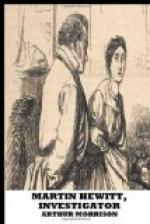“No, I think not. Indeed, she goes out very little—her health is usually bad. She was indoors, too, at the time of the Heath robbery, since you ask. But come, now, I don’t like this. It’s ridiculous to suppose that she knows anything of it.”
“I don’t suppose it, as I have said. I am only asking for information. That is all your resident family, I take it, and you know nothing of anybody else’s movements—except, perhaps, Mr. Lloyd’s?”
“Lloyd? Well, you know yourself that he was out with the ladies when the first robbery took place. As to the others, I don’t remember. Yesterday he was probably in his room, writing. I think that acquits him, eh?” Sir James looked quizzically into the broad face of the affable detective, who smiled and replied:
“Oh, of course nobody can be in two places at once, else what would become of the alibi as an institution? But, as I have said, I am only setting my facts in order. Now, you see, we get down to the servants—unless some stranger is the party wanted. Shall we go outside now?”
Lenton Croft was a large, desultory sort of house, nowhere more than three floors high, and mostly only two. It had been added to bit by bit, till it zigzagged about its site, as Sir James Norris expressed it, “like a game of dominoes.” Hewitt scrutinized its external features carefully as they strolled around, and stopped some little while before the windows of the two bed-rooms he had just seen from the inside. Presently they approached the stables and coach-house, where a groom was washing the wheels of the dog-cart.
“Do you mind my smoking?” Hewitt asked Sir James. “Perhaps you will take a cigar yourself—they are not so bad, I think. I will ask your man for a light.”
Sir James felt for his own match-box, but Hewitt had gone, and was lighting his cigar with a match from a box handed him by the groom. A smart little terrier was trotting about by the coach-house, and Hewitt stooped to rub its head. Then he made some observation about the dog, which enlisted the groom’s interest, and was soon absorbed in a chat with the man. Sir James, waiting a little way off, tapped the stones rather impatiently with his foot, and presently moved away.
For full a quarter of an hour Hewitt chatted with the groom, and, when at last he came away and overtook Sir James, that gentleman was about re-entering the house.
“I beg your pardon, Sir James,” Hewitt said, “for leaving you in that unceremonious fashion to talk to your groom, but a dog, Sir James—a good dog—will draw me anywhere.”
“Oh!” replied Sir James, shortly.
“There is one other thing,” Hewitt went on, disregarding the other’s curtness, “that I should like to know: There are two windows directly below that of the room occupied yesterday by Mrs. Cazenove—one on each floor. What rooms do they light?”
“That on the ground floor is the morning-room; the other is Mr. Lloyd’s—my secretary. A sort of study or sitting-room.”




